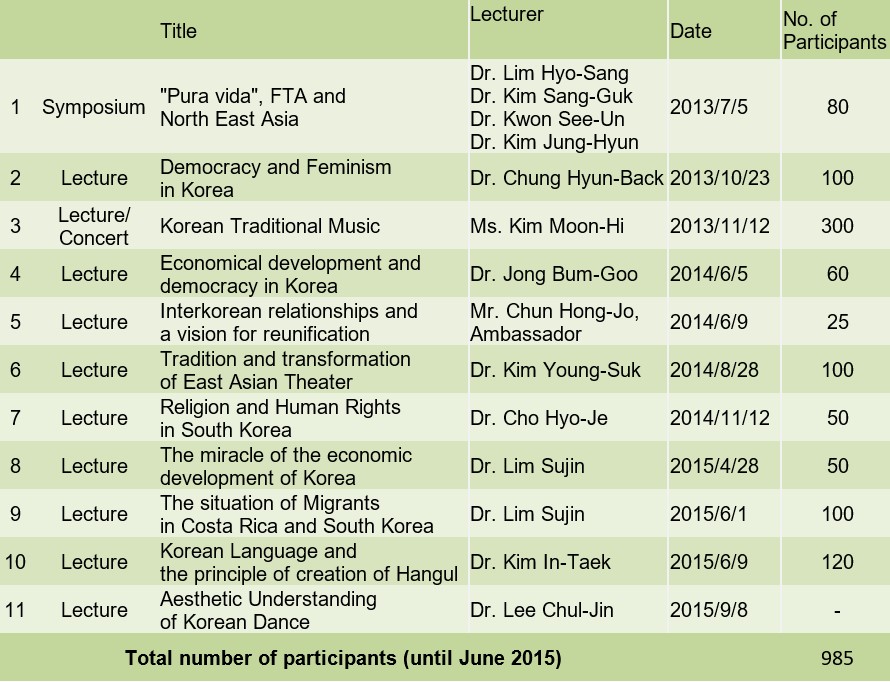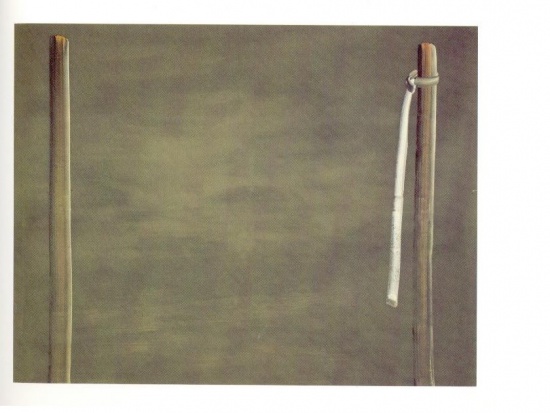Korean Studies in Costa Rica: Considering KoSASA Model
| Henning Jensen-Pennington | |

| |
| Name in Latin Alphabet: | Henning Jensen-Pennington |
|---|---|
| Nationality: | Costa Rican |
| Affiliation: | President, University of Costa Rica |
목차
- 1 I. Introduction
- 1.1 1. Establishment of the Chair for Korean and East Asian Studies (CECEA) at the University of Costa Rica
- 1.2 2. Background of the establishment of the Chair for Korean and East Asian Studies at the University of Costa Rica
- 1.3 3. The Overall Aim of the CECEA[5]
- 1.4 4. KSPS Seed Program for Korean Studies: Project plan for the UCR 2013-2016
- 2 II. Report of activities
- 3 III. Current state and Future Plan
- 4 IV. Closing remarks
- 5 각주
- 6 발표문 목록
I. Introduction
1. Establishment of the Chair for Korean and East Asian Studies (CECEA) at the University of Costa Rica
The University of Costa Rica (UCR) established the Chair for Korean and East Asian Studies (Cátedra de Estudios de Corea y el Este Asiático, CECEA) in July 2013. It was one of three “international chairs” which the university founded as an important part of its strategy to internationalize education in the context of globalization. The Humboldt Chair (Cátedra Wilhelm y Alexander von Humboldt en Humanidades y Ciencias Sociales) and the Chair for African and Caribbean Studies are the two other Chairs. Structurally, the chairs report directly to the vice-president of academic affairs.
Comparing with the most Asian Studies programs of other universities in the world in which Sinology or Japanese studies has the main focus, the CECEA at the UCR has the characteristic that it starts with Korean studies in order to develop East Asian studies. It is due to our special interest for Korea as a country which is rather a small one with the history of being colonized, but has cultivated rich culture and achieved simultaneously remarkable development in economy as well as democracy. Costa Rica is also a small country with colonial past, but has established stable democracy and social welfare, realized peace and human rights policies and developed high esteem for the Nature. Viewing with this background in mind Korea has diverse aspects intriguing to Costa Ricans.
The creation of the Chair for Korean and East Asian Studies was provided for in the university’s own budget without any external financial support, which is not a usual case in Latin America. After deciding to establish the Chair, the UCR applied to the Seed Program for Korean Studies Promotion Service for the period of 2013-2016, and it was approved.[1]
The Chair is run by Dr. Choe Hyondok who is supported by an advisory committee composed of four professors from different disciplines due to the fact that Korean and Asian studies are regional disciplines that require an interdisciplinary approach.[2] A visiting professor and a language education intern dispatched by the Korea Foundation are leading four courses of Korean language and cooperating with the Chair.
2. Background of the establishment of the Chair for Korean and East Asian Studies at the University of Costa Rica
According to the resolution of the university (Resolución VD-R-8969-2013)[3], which documents the decision to establish the CECEA, the background is explained as follows:
1. The first links between East Asia and Latin America date to the sixteenth century. Even though they had a diverse and significant impact on our region, they used to be invisible.
2. The first decade of the XXI century has witnessed the growing global importance of East Asia in geopolitical, economic, and socio-cultural realms. The increasing influence of the so-called "Asian Dragons" in economic, political and cultural sectors is an example of the impact of this region on the rest of the world.
3. In the context of globalization, it is necessary for nations and institutions to form economic, commercial, political and cultural alliances. Following this pattern, the level of interrelation, even interdependence between different regions of the world has advanced tremendously. Latin America is no exception.
4. The relations between East Asia and Latin America, in general, and between the Republic of Korea and Costa Rica, in particular, have also been strengthened by this phenomenon.
5. The majority of such exchanges have been taking place in the commercial and political sectors. However, the aforementioned transformations convey a direct challenge to the academic world. Universities should be actively involved in these transformations by enforcing academic policies, which are in step with current global issues and are relevant to the development of the academy itself.
6. The current status of Korean and East Asian studies in Latin America and of Latin American studies in Korea is substandard. It is necessary to provide more depth as well as a broader historical and cultural foundation to such relations.
7. The University of Costa Rica has the potential to develop programs of academic convergence with the cultures of East Asia, in general, and Korea, in particular, for students and educators. The experience of this intercultural encounter and the academic reflection resulting from it, will contribute to strengthening humanistic and pluralistic education. This is what the UCR aspires to achieve.
8. The creation of an institutionalized space for Korean and East Asian studies will promote the exchange of research and teaching between Costa Rica and these cultures. It will be open to all areas of knowledge, and promote the proposal and implementation of projects from interdisciplinary approaches. The establishment of a Chair will integrate exchange and cooperation between Costa Rica and these areas into the structure of the university.
9. In the short term and the long term, the continued contributions of the Chair may contribute to the establishment of an Institute of East Asian Studies at the University of Costa Rica. The Chair will promote a model for intercultural cooperation under the framework of the South-South exchange, which will coexist with the historical, and often unequal relationship of the North-South exchange.[4]
In summary, the University of Costa Rica takes note of the global process, in which the role of East Asia is rapidly growing, and recognizes the necessity to respond to it academically. As a way of institutionalizing this academic response, the university decided to establish the Chair for Korean and East Asian Studies. This Chair will work toward strengthening intercultural encounters between Costa Rica and East Asia and will contribute to reinforcing humanistic and pluralistic education, in accordance with the goals of the UCR.
It is to stress that it is the on the basis of following the humanistic ideals of education, that the UCR decided to introduce Korean and East Asian Studies, especially taking into consideration that the crisis of humanities in the context of neoliberalism even in education has been a main theme of self-reflecting discourse in universities.
3. The Overall Aim of the CECEA[5]
The principal aim of the CECEA is to develop Korean Studies in Costa Rica and promote intercultural academic exchange in research and teaching, as well as to develop academic cooperation between South Korea and Costa Rica in particular, and between East Asia and Latin America in general. It covers in principle every scientific field; however in its initial phase it concentrates on the humanities, cultural, and social sciences. As trans-regional studies, the projects of the Korea-Chair will be conducted mainly using interdisciplinary approaches.
Through the establishment of the Chair, Korean-Costa Rican exchange and cooperation will be structurally anchored in the academic system of the UCR. This will allow future exchanges to be of a greater quality, depth, and reliability.
The Chair’s goal is to establish a Korean Studies major in order to strengthen its educational function as a place to prepare Korean experts, who can contribute specialized knowledge and skills to various professional fields dealing with Korea.
4. KSPS Seed Program for Korean Studies: Project plan for the UCR 2013-2016
The CECEA has planned for its first three years to concentrate on developing a sound foundation for introducing Korean Studies at the UCR. In view of the fact that the UCR provided no courses or academic activities focusing on Korea, the CECEA planned to also try to reveal the potential for an interest in Korean Studies among students, professors, and other scholars.
In relation to the KSPS-Seed program, we proposed that the KSPS lend us support for the following plans:
- to invite short-term guest lecturers to provide regular courses in Korean Studies at the UCR
- to employ an research assistant
- to organize academic events such as public lectures, symposia, conferences, etc.
II. Report of activities
1. Regular courses in Korean Studies
In the second semester of 2013, the UCR offered two regular courses in Korean Studies for the first time in its history. (1) Prof. Choe Hyondok, the newly appointed professor for Korean and East Asian studies, began to teach one course each semester at the School of Philosophy, which is open to any student at the UCR.
(2) According to the Memorandum of Understanding agreed to by the Korea Foundation and the Universidad de Costa Rica in 2012, a visiting professor, Jo Jaehyun, was dispatched to Costa Rica in August 2013 to teach Korean language. He reported to the School of Modern Languages under the Faculty of Liberal Arts of the UCR. In the first semester he taught one course and created a curriculum for Korean language education in the UCR. Starting from the second semester he taught two courses (6 hours per week) each semester.
After it was announced that the UCR had started offering Korean language courses, a great amount of interest was generated. Far more than 100 students tried to register for the course, but only 25 were allowed to enroll in the course.
One year later the UCR received one more Korean teacher as a language education intern (Ms. Kim Jisun) for one year starting from August 2014. In last semester, the fourth semester after the establishment of the CECEA, there are 54 students learning Korean language in four classes in four different levels.
(3) Based on the KSPS Seed program, the CECEA have invited one visiting professor every year for one semester, who teaches two regular courses in Korean Studies in cooperation with the diverse disciplines taught at the university. In the first year the CECEA invited Dr. Jong Bum-Goo (political sciences), in the second year, Dr. Cho Hyo-Je (sociology). Each of them gave two courses.
(4) In January 2015, the CECEA began to adopt courses from the KF E-School. In last semester, i.e. from January through May 2015, the CECEA is offering two courses from the KF E-School in addition to the regular ones offered at the UCR. Nearly 30 students participated in these courses.
The CECEA started the Korean Studies program with two courses and 34 students in the fall semester of 2013. Now, two years later the CECEA is offering 9 courses and more than 100 students are taking part in them. Table-1 and Table-2 show the increase in courses and their participants. 파일:Hen.jpg
Evaluation of offering courses in Korean Studies
The CECEA began work in a university, which had not offered Korean Studies ever before in its history. But after one and half years, there are nearly 100 students enrolled in 7 different Korean Studies courses. The total number of students who have participated in the courses provided by the CECEA during the last four semesters is slightly more than 300.
Seven professors, including those who only taught for one or two semesters, have participated in the program. Two of these professors were invited through the KSPS Seed program. These two taught four courses, in which nearly 70 students took part. As for the staff, there are three assistants working for the program.
There is no need to explain the importance of establishing courses for the purpose of developing Korean Studies. The Korean Studies courses offered at the UCR have made significant contributions in the following ways:
(1) Quantitative: The number of students interested in and exposed to Korean Studies has increased, from 0 to nearly 300.
(2) Qualitative: Students have gained a deeper understanding of their interests through intellectual pursuits. They have developed analytical skills and gained the ability to discuss their interests in a more articulated way.
(3) Through contact and discussion with students we have identified the scope of their interests. This knowledge will serve as an important foundation in the process of developing a Korean Studies major at the UCR.
(4) Since the CECEA does not function as a school or academic department, its courses have been offered in cooperation with existing schools based on scientific disciplines. The schools have been very cooperative about including themes related to Korea in their curricula. Even though Korean Studies does not yet exist as a separate academic concentration, the integration of Korean studies into various disciplines at this university has already begun.
(5) These courses have been appreciated as opportunities to widen the horizons of the students and professors and let them reflect on the Eurocentric tendencies of the academia.
(6) The enthusiastic response from students to the newly established courses has helped not only the CECEA, but also the university’s administration. It is now evident to the administration that there is a great potential for Korean Studies classes to flourish at the UCR.
In the case of the UCR, the KSPS Seed program has fulfilled its function as a “seed” in its figurative sense.
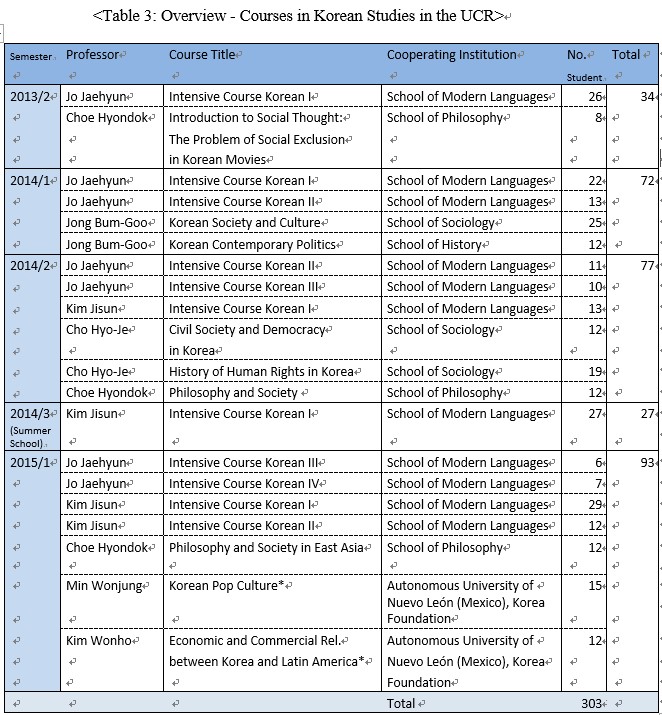
- All the courses except those marked with * are regular credit courses at the UCR.
2. Academic Events - Foro Coreano (Korea Forum)
The CECEA conceived “Foro Coreano (Korea Forum)” in order to offer an opportunity to discuss themes related to Korean studies to the broader public a few times each semester. It is an open forum in two senses. First, it is open to everyone not just UCR students. Secondly, it is open to various themes. During the first two years 10 forums were held. Nearly 1000 people participated in these activities. They have had following effects:
(1) These activities complement the courses in Korean studies offered at the UCR. The Foro Coreano gives an opportunity to the broader public. Its influence exceeds the boundaries of the University of Costa Rica. In the Foro Coreano more diverse themes can be dealt with and the students get the opportunity to hear from external experts. It contributes to awakening an interest in Korea in the broader public and to widening the pool of people interested in Korean studies.
(2) In a similar way as in the case of regular courses, the CECEA has tried to cooperate with existing departments within the university. Until now this has worked very well; other departments have been willing to work together to organize these activities. It has put down roots for a Korean Studies department in the university. It has also created a basis for developing interdisciplinary cooperation, which is essential for a regional discipline like Korean Studies.
(3) The positive response from the community confirmed that a latent interest in Korean culture has been present in Costa Rica. It is a sign of encouragement for the continuing work of the CECEA.
3. Cultural Events
The CECEA has presented once or twice a year a cultural event introducing Korean arts. In 2013 a concert of Korean traditional music (Minyo and Pansori) with lecture was held (300 participants). In the first semester of 2014 a Korean Film Festival was organized at the University and about 120 students participated. The first anniversary of the Chair was celebrated with Samul Nori Concert at the National Theater with 800 people. For 2015 a performance of Korean traditional Dance is planned.
The three events contributed to the introduction of Korean arts in Costa Rica and were received with great enthusiasm. They created a high esteem for Korean arts and awoke a curiosity and interest in Korean culture. It began to make friends of Korea among Costa Rican people.
Even though these activities were cultural rather than academic (excluding the first), they had positive effects for Korean Studies at the university too.
(1) They widened the circle of Costa Rican people interested in Korea, which is crucial to the field of Korean Studies.
(2) These events provided great publicity for the CECEA. The UCR’s interest in Korean Studies was revealed to the general public. The UCR’s Korean Studies Facebook page also gained fame. Since the Samul Nori Concert, when an item is published on the Facebook page it is viewed by hundreds of people.
4. Academic cooperation and exchange with Korea
4.1. Conclusion of Memorandum of Understanding with universities in Korea
The UCR has been interested in academic cooperation and exchange with Korea and has concluded MoU's with the following universities:
- Korea University - Pusan National University - Hanguk University for Foreign Studies (renewal prepared) - Kyunghee University (renewal prepared) - Chungnam National University - Busan University for Foreign Studies - Ulsan University - Hannam University - Handong University
Since the establishment of the CECEA contracts with Korea University and Pusan National University were added. In relation to the development of Korean studies in Costa Rica these MoU's can bring many benefits: (a) Based on these contracts UCR students can study for one or two semesters in Korea, which would be essential for students majoring in Korean Studies (if a degree program is established in the near future). (b) Through the exchange of professors the UCR can offer more courses in Korean Studies.
4.2. Academic visits by Korean professors to UCR
During the last two years 12 Korean professors visited UCR for teaching and researching. There were four cases of institutional visits with 10 visitors. Four UCR-Students visited Korean universities
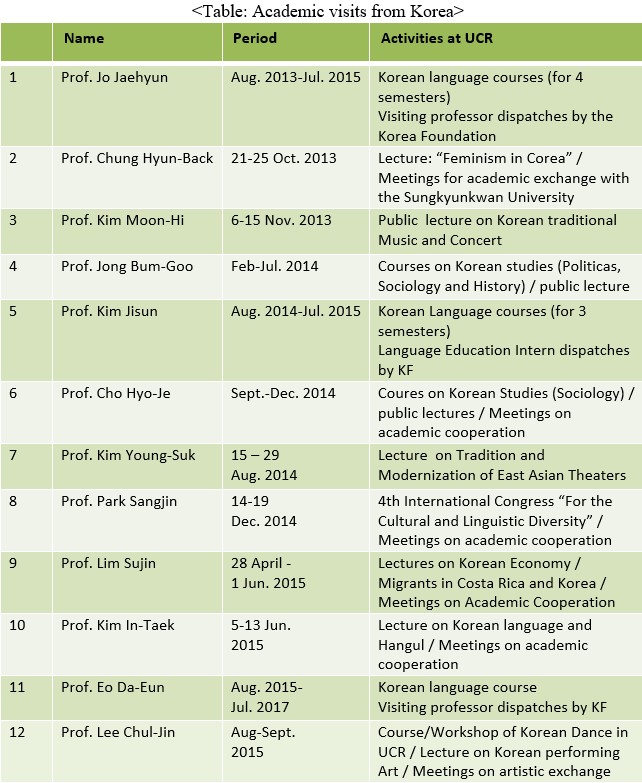
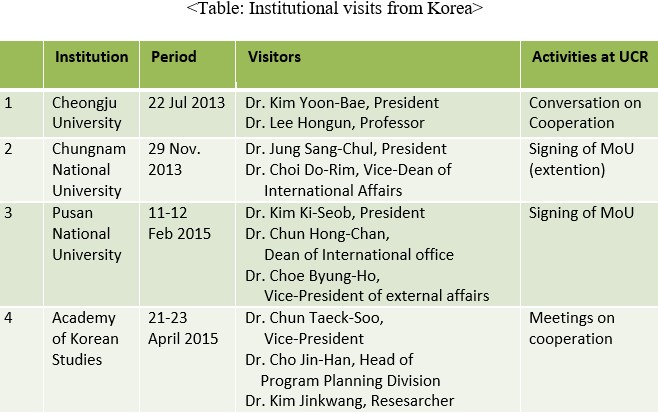
4.3. Academic Visits of UCR-professors to Korea
5. Foundation of Korean and Asian Library
The coordinator of the CECEA brought about 1,400 books on Korea and Asia when she came to Costa Rica. In the meantime the CECEA has received the donation of about 200 books from the Korea Foundation and the Korean Literature Translation Institute.
The CECEA negotiated with the central library of the University as well as that of the Faculty of Social Sciences to find a place for these books. However, these libraries cannot create a separate place for a collection of Asian Studies books due to insufficient space. And the CECEA did not agree to scatter these books according to the sorting system of the library. For the time being it has been decided to reserve a place (about 120 m2) in the building of the international chairs to found the Asian library.
Apart from the issue of how to continue acquiring new books, the following problems exist:
- Cataloguing the collection
- Integrating the catalogue in the rest of the university’s library system
- Setting up a lending system
- Employing a librarian seperately for the Asian library or making it fully integrated into the university’s existing library service system
III. Current state and Future Plan
It was only with the establishment of the CECEA in July 2013 that Korean Studies and Korean Language education began at the University of Costa Rica. In this first phase its aim was to estimate interest in Korea and the potential for developing a Korean Studies program in this country. It was also the intent of the CECEA to lead activities in order to awaken more interest in Korea as well as to deepen any existing interest.
Through its work up to this point, the interest in Korean studies among students at the UCR became more and more visible. The assumed interest in developing Korean studies education at this institution has been confirmed. In the mean time 20 courses were opened and about 300 students enrolled in them. In June 2015 the tenth Foro Coreano was held and if we add the number of participants of the 10 Foros it is nearly 980. The number of those who participated in three cultural events is more than 1200.
Under the present structure the courses of Korean studies as regular courses must belong to a existing department of individual disciplines, since the "Chair" is not a department. For example, Korean language courses have been taught through the School of Modern Languages, courses on Korean history through the School of History, courses on Korean society and culture through the School of Sociology, etc. It means that several disciplines studied in the UCR began to integrate the themes related to Korea. It has significant meaning that the UCR began to build up a basis for interdisciplinary cooperation which is indispensable for developing Korean studies as interdisciplinary regional studies. From the perspective of individual disciplines, integrating Korean themes has been deeply appreciated as an opportunity to widen the horizon of students and to stimulate them to a self-critical reflection on Euro-centric tendencies of academia.
At the same time it is also true that the courses are scattered across diverse academic disciplines. It is not easy to educate students focusing on Korea systematically and with continuity. In view of the interest of students as well as the necessity to educate Expert on Korean and East Asian issues, it is necessary to develop an independent systematic program of Korean studies from an interdisciplinary approach. In order to do this it is needed to establish an independent course of study program, which provides students with a B.A. or M.A. in Korean studies.
There are two more tasks which the CECEA is going to realize over time:
(1) It will participate in the endeavor to develop a Latin-American network of Korean Studies and especially try to create a Central American network. In view of the fact that Latin America is a continent using a common language (disregarding the differences between Spanish and Portuguese), cooperation between countries could generate a great synergetic effect. The CECEA planned to organize en Central American Encounter of Korean studies in April 2016 with the support of AKS.
(2) Teaching and research are the two pillars of the university. Due to the given conditions the CECEA has concentrated on teaching until now. Over time the importance of research will be addressed. The CECEA will create research projects. The intercultural cooperation will be important also for conceiving research projects, for example, identifying the themes which will generate Korean-Costa Rican cooperation.
IV. Closing remarks
At the beginning it is mentioned that the establishment of Korean studies at the UCR was in accordance with its humanistic ideal of education, so that the students learn to encounter different cultures, to live together with them and realize diversity of culture while recognizing the differences and respecting each other. It is especially important in the era of globalization in which many cultures come across, and not always in a fortunate way. The problems of "clash of cultures", xenophobia, racism, terrorism belong also to our today´s reality.
Doing Korean studies means participating in an intercultural dialogue with Korea. It is to hope that the students learn to respect other culture at the equal stance, to build a bridge between the differences and enrich themselves through this dialogue.
Painting by Song Hyun-Sook
각주
- ↑ UCR
- ↑ Prof. Eduardo Madrigal Muñoz (History), Prof. Adrian Pinto (Microbiology), Prof. Max Soto (Economy), Prof. Patricia Rodriguez Hölkemeyer (Political Sciences).
- ↑ This document can be downloaded from the following website: http://vd.ucr.ac.cr/index.php/component/joomdoc/resoluciones/resoluciones-del-2013/detail
- ↑ The document is in Spanish. The translation in this report is done by the author.
- ↑ In the above mentioned document related to the creation of the CECEA, Resolución VD-R-8969-2013, the Chair has the following specific aims:
- To generate more awareness in Costa Rica of the experiences of Korea and other East Asian countries from economic, socio-political, technological, scientific, and cultural perspectives.
- To encourage dialogue in academic, political, economic, scientific and technological sectors.
- To provide a space for the discussion of Costa Rican experiences relevant to the societies in Korea and other East Asian countries, as well as for the discussion of East Asian experiences relevant to Costa Rica.
- To serve as a connecting point between agencies and sectors of both nations and regions in order to promote mutual cooperation and mutual understanding.
- To promote the activities of the Chair by organizing conferences, workshops, lectures, visits from scholars, student exchange, reciprocal scholarly visits, bilingual publications, etc.
